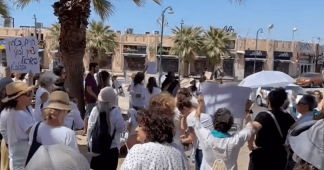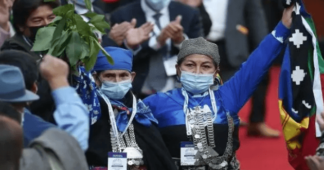“We are here to tell the stock exchange and Wall Street to stop trading our lives, that we want living wages and healthcare and clean air and voting rights.”
By Brett Wilkins
Demanding a new political discourse in which the poor are no longer blamed for their poverty in the wealthiest nation in history, hundreds of impoverished and low-income activists on Monday rallied in New York City and marched on Wall Street to take their demands directly to the center of U.S. wealth.
The Moral March on Wall Street, led by the New York Poor People’s Campaign, began at the Museum of the American Indian before heading to the New York Stock Exchange and then Trinity Church Wall Street for a mass meeting where activists and faith leaders spoke.
“We are here to tell the stock exchange and Wall Street to stop trading our lives, that we want living wages and healthcare and clean air and voting rights,” Rev. Dr. Liz Theoharis, co-chair of the Poor People’s Campaign: A National Call for Moral Revival, said during the march. “And we want them now! And if we don’t get them, we’ll shut it down.”
Addressing the church meeting, Kelly Smith, a tri-chair of the New York Poor People’s Campaign, confided: “I worry for my son. I worry that he’ll be able to find a living wage. I worry that he lives in a world where his Black skin is valued less than my white skin.”
“And I could worry and worry and worry and wring my hands. Or, I could stand up. I could speak up. I could fight,” she added. “Well, we are going to stand up. We are going to speak out. And we are going to mobilize for June 18th in Washington, D.C.”
What a powerful cry for economic justice on Wall Street with @UniteThePoor! Join as we head to DC on June 18th and then to the POLLS in November! pic.twitter.com/9KsLJnoCA3
— Macky Alston (@MackyAlston) April 12, 2022
That’s when Poor People’s Campaign co-chair Bishop William J. Barber II, Theoharis, and movement activists from across the United States will hold a Poor People’s and Low-Wage Workers’ Assembly and Moral March on Washington and the Polls.
More than just a day of action, the event is billed as “a declaration of an ongoing, committed moral movement” to “build power, shift the political narrative, and make real policies to fully address poverty and low wealth from the bottom up.”
Speaking Monday in New York, Barber said that “we’ve got to do this” on June 18 “because our politics are trapped in the lies of scarcity to keep alive the lies of trickle-down economics and the lies of neoliberalism, which leave people out.”
Join @UniteThePoor and many other unions & organizers on June 18, 2022 for the National Call for Moral Revival March in Washington D.C. to demand no war, voting rights protections, a living wage for all, healthcare and a moral economy that works for everyone @RevDrBarber pic.twitter.com/Uc5q12AcIi
— Your Activist Wonk 👩🏻💻📱 (@activistwonk) April 11, 2022
Condemning “the false narrative of Christian nationalism and racism and militarism and climate devastation,” Barber continued:
“You’ve got a mess. These kinds of politics turn us against each other, blame the poor for their poverty even though we live in the midst of abundance. And we know that poverty is not so much a personal choice as a political consequence of policies. We have the resources to meet the needs of everybody. The only thing we don’t have enough of is moral consciousness and the will to do what’s right. And that’s our job—to shift the moral narrative of this nation.”
Marcher Volney Gordon, a Vermonter who has been homeless for 15 years since being priced out of New York City, said at Monday’s march that he “became an expert in poverty on these very streets—in the shadow of obscene wealth and amidst the headquarters of institutions that, having built their wealth on the backs of our class, have waged an all-out war on those very same people.”
— Arkansas Poor People's Campaign (@ArkansasPPC) April 12, 2022
“The ruling class doesn’t want us to strategize across lines of division because our strength, the strength of the working class, the poor, is what powers this machine,” he added.
Published at www.commondreams.org
We remind our readers that publication of articles on our site does not mean that we agree with what is written. Our policy is to publish anything which we consider of interest, so as to assist our readers in forming their opinions. Sometimes we even publish articles with which we totally disagree, since we believe it is important for our readers to be informed on as wide a spectrum of views as possible.











